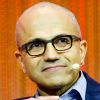20 Technology Books That Separate Experts from Amateurs
Recommended by Mark Zuckerberg, Satya Nadella, Bill Gates, and 17 more experts, these Technology books offer insights to accelerate your learning.







What if the technology shaping your world is only half the story? Behind every device and code lies a history, a set of ethical dilemmas, and a vision of the future. Today, technology influences everything—from geopolitics to personal productivity—yet understanding its layers requires more than surface knowledge.
Leaders like Mark Zuckerberg, co-founder of Facebook, and Satya Nadella, CEO of Microsoft, rely on deep insights from books like The Idea Factory and The Soul of a New Machine to navigate the complex tech landscape. For instance, Zuckerberg's endorsement of Bell Labs’ history reveals how foundational innovation still drives today's platforms, while Nadella’s recommendation of Kidder’s narrative highlights the human challenges behind technological breakthroughs.
While these expert-curated books provide proven frameworks, readers seeking content tailored to their specific background, skill level, and interests might consider creating a personalized Technology book that builds on these insights for a more targeted learning journey.
Recommended by Prasanna Viswanathan
CEO, Swarajyamag
“Chip War: The Best Economics Book Of 2022 And Lessons For India @Tushar15_ via @swarajyamag” (from X)
by Chris Miller··You?
by Chris Miller··You?
Chris Miller, a historian specializing in international and economic history, unpacks the complex geopolitical and technological battle over microchip supremacy in this detailed narrative. You gain insight into how microchips, often overlooked, underpin modern military and economic power, and why America's dominance is challenged by rising powers like China. The book delves into the intricacies of chip design, manufacturing, and the strategic investments reshaping global supply chains, with vivid examples such as Taiwan's critical role and China's vast import expenditures. You'll appreciate how these technological shifts impact global politics and industry, making this a strong fit for those curious about the intersection of technology and international relations.
Recommended by Andrew Huang
Author of The Hardware Hacker
“A celebration of the electronic aesthetic . . . blur[s] the line between engineering and art.” (from Amazon)
by Windell Oskay, Eric Schlaepfer··You?
by Windell Oskay, Eric Schlaepfer··You?
Windell Oskay’s deep background in physics and mathematics, combined with his passion for photography and robotics, fuels this fascinating exploration of electronic components. You’ll gain a detailed understanding of how everyday gadgets function through vividly detailed cross-sectional photos that reveal the intricate construction of items like resistors, LEDs, and stepper motors. The book doesn’t just show you the parts; it explains their roles and manufacturing nuances, making it a unique blend of technical insight and visual artistry. Whether you’re tinkering with electronics or appreciating design, this book offers a fresh perspective on the hidden craftsmanship inside your devices.
by TailoredRead AI·
This personalized AI book on technology mastery is crafted to focus on your unique background and goals, delivering tailored insights that explore essential technology concepts and skills. It covers a broad array of topics from foundational principles to advanced techniques, matching your specific interests and helping you navigate complex technological landscapes with confidence. The book examines how various technology fields interconnect and evolve, providing a clear pathway through intricate content that often requires multiple sources to fully grasp. By concentrating on what matters most to you, this tailored guide reveals a personalized journey through the vast world of technology, empowering you to build mastery with targeted depth and clarity.
Recommended by Publisher's Weekly
“...it's tone is as inviting as the case it makes is compelling. Business leaders looking for guidance about DevOps practices, or to get started on an implementation plan, will find much to work with here.” (from Amazon)
by Gene Kim bestselling author of The Phoenix Project The Unicorn Project and Wiring, Jez Humble, Patrick Debois, John Willis, Nicole Forsgren··You?
by Gene Kim bestselling author of The Phoenix Project The Unicorn Project and Wiring, Jez Humble, Patrick Debois, John Willis, Nicole Forsgren··You?
Gene Kim's decades of experience in DevOps and IT transformation led to this detailed guide that moves beyond theory into practical application. You learn how to implement DevOps practices across entire organizations, not just IT departments, with insights drawn from 15 new case studies including Adidas and the U.S. Air Force. The book covers measurable strategies for improving agility, reliability, and security, supported by Nicole Forsgren's research on performance metrics. This book suits technology leaders and practitioners aiming to scale DevOps beyond isolated teams into enterprise-wide change.
Recommended by Kevin Kelly
English commentary expert, tech thinker
“A magnificent and rewarding book. Every step of this structured instruction is expertly illustrated with photos and crisp diagrams. This really is the best way to learn.” (from Amazon)
by Charles Platt··You?
Charles Platt, with decades of hands-on experience and a background as a contributing editor for Make magazine, invites you into the world of electronics through discovery and experimentation. This book breaks down the core components—resistors, capacitors, transistors, and more—demystifying how they function and interact within circuits, even when microcontrollers are involved. You'll gain not just theoretical knowledge but also practical guidance on essential tools and supplies, supported by clear photos and diagrams that walk you through each project step. If you're eager to build a solid foundation in electronics or want a reliable reference for your DIY ventures, this primer offers a straightforward path without fluff or jargon.
Recommended by Mark Zuckerberg
Co-Founder & CEO of Facebook
by aa··You?
Jon Gertner grew up near Bell Labs and brings a unique personal connection to this detailed historical account of one of America's most influential innovation powerhouses. You get a firsthand look at how Bell Labs fostered breakthroughs like the transistor and digital communications, shaped by the visionaries behind them, such as Claude Shannon and Mervin Kelly. The book explores both the inventive processes and organizational culture that enabled decades of technological advances, offering insights into managing innovation that remain relevant. If you want to understand the roots of today's technology landscape and the dynamics of collaborative creativity, this book delivers that perspective with clarity and depth.
by TailoredRead AI·
This tailored book explores rapid advancement in key technology fields by focusing precisely on your interests, background, and goals. It covers foundational concepts and emerging trends, delivering a personalized learning path designed to accelerate your understanding and skill development in technology. The book examines daily focused actions that build competence efficiently, helping you connect expert knowledge with practical application. By concentrating on areas that matter most to you, it reveals how to navigate complex technological landscapes with clarity and confidence. This personalized approach ensures your learning experience is engaging, relevant, and immediately useful, making progress tangible throughout your 30-day journey.
Recommended by David Allen
Creator of time management method GTD
“A well-written, cogent, and useful manual for staying clear in the knowledge-worker world.” (from Amazon)
by Tiago Forte··You?
When Tiago Forte developed his methods while consulting for organizations like Toyota and Genentech, he realized traditional note-taking failed to harness the flood of digital information we face daily. This book teaches you how to organize your digital life through a "Second Brain," a personal system that captures and connects your ideas across devices. You learn specific frameworks like the PARA method for managing projects and resources, enabling you to unlock creative potential and reduce overwhelm. If you’re juggling knowledge work and want a reliable way to retain and use information effectively, this book offers a structured approach rather than generic productivity tips.
Recommended by Brian Leroux
Cofounder @begin; AWS Serverless Hero
“brilliant read by @isntitvacant exploring our craft dovetails nicely w @davefarley77's book w I feel is the best insight we have to define the term 'software engineering'” (from X)
Drawing from decades as a software engineer and architect, David Farley developed this book to rethink how software professionals approach their work. You gain insights into managing complexity and fostering a mindset of learning and exploration, improving everything from your code quality to workflow organization. Farley outlines principles that help you choose tools wisely, measure progress beyond just lines of code, and sustain incremental development. Chapters delve into balancing rigor with flexibility and learning from historical patterns in software engineering. This book suits programmers, managers, and technical leads who want to refine their craft pragmatically and adapt to evolving challenges without getting bogged down in rigid processes.
Recommended by Kate Crawford
AI social implications expert, NYU professor
“@RDBinns Yep, lots of great resources on this. @ruha9’s book goes into contextual use really well, imho. For the past few years I’ve been describing it in terms of parity != justice.” (from X)
by Ruha Benjamin··You?
by Ruha Benjamin··You?
What if everything you thought about technology being neutral was wrong? Ruha Benjamin, a professor at Princeton specializing in race and technology, argues convincingly that many modern technologies embed racial bias under the guise of objectivity. You’ll explore the concept of the “New Jim Code,” where algorithms and automation don’t just reflect social inequalities but actively reinforce and amplify them, often invisibly. The book challenges you to rethink race as a constructed technology itself and equips you with sharp sociological tools to critically analyze the tech shaping society today. If you’re interested in the intersection of race, ethics, and technology, this book offers profound insights that will challenge your perspectives.
Recommended by Raju Narisetti
Media executive with 30 years global experience
“The U.S. education system must jettison its one-size-fits-all approach to secondary school and offer more trade skills-based pathways for students. from @McKinsey #TitaniumEconomy book:” (from X)
by Asutosh Padhi, Gaurav Batra, Nick Santhanam··You?
by Asutosh Padhi, Gaurav Batra, Nick Santhanam··You?
Unlike most technology books focusing solely on software and digital startups, this one shifts the spotlight to the often-overlooked industrial tech sector reshaping America's economy. Authored by McKinsey veterans deeply embedded in industrial transformation, it explores how companies producing aerospace parts and recycled materials are quietly driving growth and innovation. You’ll gain insights into the economic impact of these firms, workforce development challenges, and the infrastructure investments needed to sustain this resurgence. Chapters detail how industrial technology can create high-paying domestic jobs and why embracing this sector matters for future economic resilience. This book is ideal if you're looking beyond Silicon Valley to understand tangible, impactful technology in manufacturing.
Recommended by The New York Times
“Kaku spends much of [Quantum Supremacy] recounting the history of computing, bringing listeners back to the Turing machine and the invention of transistors as crucial foundations. That mind-blowing future is the focus. . . . [Kaku's] lucid prose and thought process make abundant sense of this technological turning point.” (from Amazon)
Michio Kaku, a physics professor and cofounder of string field theory, wrote this book to chart the quantum computing revolution reshaping technology's future. You’ll explore how quantum principles harness atomic-scale processes to vastly surpass traditional computing, with detailed discussions on applications like drug discovery, energy solutions, and AI advancements. The book offers clear metaphors and summaries that make complex topics accessible, especially chapters on quantum mechanics fundamentals and potential societal impacts. If you’re curious about how this technology could alter industries from medicine to environmental science, this book gives you a straightforward, science-backed perspective without oversimplifying.
Recommended by Alex Pareene
Contributing editor, The New Republic
“@jalefkowit yeah I love this kind of book too. thanks for the recommendation” (from X)
by Tracy Kidder··You?
by Tracy Kidder··You?
Drawing from his Pulitzer Prize-winning narrative skills, Tracy Kidder takes you inside the intense world of early computer engineering, focusing on a fierce race to build a groundbreaking machine. You'll gain an insider's view of the technical challenges and human determination behind this high-stakes project, especially through detailed accounts of the engineering team’s dynamics and problem-solving strategies. Chapters vividly portray the pressures and creativity fueling innovation, making it particularly insightful for those interested in the intersection of technology development and team culture. This book suits anyone fascinated by technology’s history and the complex craft behind hardware breakthroughs, though it demands patience for technical detail.
Recommended by Bill Gates
Co-Founder & Former CEO of Microsoft
“Ray Kurzweil is the best person I know at predicting the future of artificial intelligence.” (from Amazon)
by Ray Kurzweil··You?
by Ray Kurzweil··You?
What if everything you knew about artificial intelligence and human progress was about to shift? Ray Kurzweil, with over six decades of pioneering work in AI, lays out how technology is on track to amplify human intelligence a millionfold, transforming life as we know it. You’ll explore topics from nanobots rebuilding matter atom by atom to connecting minds to the cloud, all grounded in his Law of Accelerating Returns. The book digs into challenges like AI’s impact on jobs and the ethics of 'after life' tech, offering a nuanced vision for those curious about the future intersection of humanity and technology. If you’re fascinated by how cutting-edge science will redefine existence, this book speaks directly to you.
Recommended by Marty Cagan
Partner at Silicon Valley Product Group
by Marty Cagan··You?
by Marty Cagan··You?
When Marty Cagan first uncovered the distinct ways top tech giants craft products, he distilled these insights into a guide for anyone building technology products that resonate deeply with users. You’ll explore how to assemble the right teams, discover products that truly meet customer needs, and foster a culture that supports innovation. Chapter discussions include assembling talent and skillsets, lightweight yet effective processes, and real-world examples from companies like Google and Netflix. This book suits product managers, startup founders, and tech leaders aiming to sharpen their product development approach and align business success with customer love.
Recommended by Jason Crawford
Founder, Roots of Progress; technology historian
“There are many writers with optimistic visions of the future. However, the goals I most often hear are all the negation of negatives: cure cancer, eliminate poverty, stop climate change. . . . This is good, but it is not enough. [These techno-optimists] are content with bringing the whole world up to the current best standard of living, but not increasing it. In this context, I found Where Is My Flying Car? refreshing. Hall unabashedly calls for unlimited progress in every dimension.” (from Amazon)
by J. Storrs Hall··You?
by J. Storrs Hall··You?
J. Storrs Hall challenges the conventional wisdom that technological progress has simply slowed due to technical hurdles, arguing instead that social and economic factors have played a dominant role since the 1970s. Drawing on his engineering and nanotechnology background, Hall traces the roots of this stagnation through chapters examining everything from suppressed nuclear energy to cultural resistance against innovation. You’ll engage with a nuanced narrative explaining why the futuristic promises of flying cars and space colonies remain unfulfilled, and what it would take to reignite exponential progress. This book is especially insightful if you’re curious about the intersection of technology, economics, and societal attitudes toward innovation.
Recommended by Tony Robbins
Business coach and motivational speaker
“Diamandis and Kotler have written a powerful and beautiful masterpiece outlining a compelling future for humanity. The Future is Faster Than You Think offers CEOs and entrepreneurs a clear vision on the transformation of every major industry this decade. Required reading for anyone who wants to surf above the tsunami of change.” (from Amazon)
by Peter H. Diamandis, Steven Kotler··You?
by Peter H. Diamandis, Steven Kotler··You?
When Peter H. Diamandis and Steven Kotler explore the future in this book, they challenge the usual slow-and-steady view of technological progress. Drawing on their deep expertise in innovation and peak performance, they reveal how multiple exponential technologies like AI, digital biology, and 3D printing collide to reshape industries and daily life within a decade. You’ll gain clarity on how these convergences impact sectors from transportation to healthcare, supported by vivid examples and insightful forecasts. This book suits anyone wanting a grounded yet forward-looking perspective on rapid tech shifts, especially entrepreneurs and leaders preparing for change.
Recommended by Edward Snowden
Whistleblower and privacy advocate
“Hardware, says Bunnie Huang, is a world without secrets: if you go deep enough, even the most important key is expressed in silicon or fuses. His is a world without mysteries, only unexplored spaces. This is a look inside a mind without peer.” (from Amazon)
by Andrew Bunnie Huang··You?
by Andrew Bunnie Huang··You?
When Andrew "bunnie" Huang first ventured into the sprawling electronics markets of Shenzhen, he uncovered the intricate dance between manufacturing realities and open hardware ideals. This book offers a rare inside look at navigating factories, choosing components, and balancing engineering challenges with legal and societal issues surrounding reverse engineering. You’ll gain detailed insights into creating Bill of Materials, selecting manufacturers, and understanding intellectual property differences between China and the U.S. If you’re deeply involved in hardware development or curious about the ecosystem behind your devices, this book provides a candid, experience-driven perspective that goes beyond mere technical manuals.
Recommended by Reid Hoffman
Co-Founder of LinkedIn, Partner at Greylock
“Since 1985, when The Big Score was originally published, the dominant and seemingly enduring companies it documented have mostly fallen by the wayside, and the overall technological landscape is wildly different. And so, while The Big Score continues to exist as an encyclopedic and highly entertaining record of Silicon Valley’s origins, it also provides a glimpse of what’s to come. Nothing ever changes in Silicon Valley, it implicitly testifies, and nothing ever stays the same.” (from Amazon)
by Michael S. Malone··You?
by Michael S. Malone··You?
What happens when decades of firsthand tech reporting meet the dynamic rise of Silicon Valley? Michael S. Malone, a seasoned journalist with over 30 years covering tech, compiles a vivid chronicle of the Valley’s origins and evolution. You’ll gain insight into the gritty beginnings of legendary companies like Hewlett-Packard and Apple, and the complex personalities behind them, from Nobel laureates to garage entrepreneurs. Chapters delve into the unvarnished realities—intense work ethic, betrayals, and even espionage—that shaped the industry. If you want a nuanced history revealing how early innovation and human drama fuelled Silicon Valley’s ascent, this book is for you.
by Dagogo Altraide··You?
Unlike most technology histories that focus narrowly on inventions, Dagogo Altraide draws on his engineering and marketing background to weave a narrative linking past breakthroughs with future possibilities. You’ll explore the fascinating stories behind key innovations, like Tesla’s electrical experiments and the dawn of artificial intelligence, gaining a clearer understanding of how these moments shape today’s tech landscape. Chapters delve into the motivations and challenges faced by visionary thinkers, offering insights into the human drive behind technology’s evolution. This book suits anyone curious about the deep history fueling modern advances and those wanting a broader context for emerging technologies.
Recommended by Marshall Kirkpatrick
Influencer & analyst relations at Sprinklr
“If you want to see a sophisticated & well informed thesis about how the world is changing dramatically, I recommend this Twitter thread and book from one of the world’s most inspiring community builders.” (from X)
by Azeem Azhar··You?
When Azeem Azhar first recognized the accelerating pace of technological change, he set out to map how this reshapes society, politics, and business. You explore his idea of the “exponential gap,” where technology outstrips our social and political systems, leading to challenges like inequality and polarization. The book walks you through examples like AI, renewable energy, and synthetic biology to illustrate these shifts, alongside policy proposals to bridge the gap. It’s especially useful if you want to grasp the broader implications of rapid tech advances beyond just gadgets or software.
Recommended by Michael Mcfaul
Professor and foreign policy expert
“@DAV_Patriot Ps, I was trying to spread the word about a great new Twitter job. Meant no offense. I’m reading this book today and am convinced we need more people in th cyber policy business” (from X)
by Rob Reich, Mehran Sahami, Jeremy M. Weinstein··You?
by Rob Reich, Mehran Sahami, Jeremy M. Weinstein··You?
What if everything you knew about Big Tech's role in society was wrong? Rob Reich, a philosopher and ethics leader at Stanford, along with his co-authors, argues that the relentless focus on optimization in technology has compromised core democratic values. You’ll gain insight into how this efficiency mindset shapes biased algorithms, surveillance capitalism, and job displacement, often at society’s expense. The book provides a unique lens from academics deeply embedded in both tech and ethics, explaining how technologists’ values get imposed broadly and offering concrete ideas to reclaim control. This is a thoughtful read for anyone interested in the intersection of technology, democracy, and societal impact.
Get Your Personal Technology Guide in 10 Minutes ✨
Stop following generic advice. Receive targeted tech strategies tailored just for you.
Trusted by 68 technology experts worldwide
Conclusion
This collection illuminates three essential themes: the intricate dance between technology and geopolitics, the human stories behind innovations, and the ethical challenges shaping our digital future. If you're fascinated by the forces driving semiconductor supremacy, start with Chip War. For those eager to master software development practices, Modern Software Engineering and The DevOps Handbook offer practical wisdom.
For rapid application, combining Inspired with Building a Second Brain can sharpen your product management and knowledge organization skills. Meanwhile, readers concerned with technology’s societal impact should prioritize Race After Technology and System Error for critical perspectives.
Alternatively, you can create a personalized Technology book to bridge the gap between general principles and your specific situation. These books can help you accelerate your learning journey with expert-validated knowledge and practical insights.
Frequently Asked Questions
I'm overwhelmed by choice – which book should I start with?
Start with a book that matches your current interests. For a broad historical view, try The Idea Factory. If you're focused on software, Modern Software Engineering offers practical guidance. Align your choice with what you want to learn first, so your reading feels purposeful and manageable.
Are these books too advanced for someone new to Technology?
Many of these books, like Make and Building a Second Brain, are accessible to beginners. They break down complex concepts clearly. Others, such as Chip War, provide context that can deepen understanding as you grow. You can mix foundational and advanced reads to suit your pace.
What's the best order to read these books?
Consider starting with historical and foundational titles like The Big Score or The Soul of a New Machine to understand technology's roots. Then move on to applied guides like The DevOps Handbook or Inspired. Finally, explore forward-looking books like The Singularity Is Nearer to grasp future trends.
Should I start with the newest book or a classic?
Both have value. Classics often provide timeless principles and context, while newer books offer fresh perspectives on emerging tech. For example, The Singularity Is Nearer updates AI futures, while The Idea Factory remains a key historical account. Balance your reading to get a full picture.
Do I really need to read all of these, or can I just pick one?
You don't need to read them all. Choose books that directly align with your interests or challenges. Each book offers unique insights—whether it's hardware hacking or tech ethics. Prioritize what will most benefit your goals for a focused and rewarding experience.
How can I get personalized Technology insights without reading dozens of books?
Yes, while these expert recommendations offer great depth, personalized content can bridge general knowledge and your specific needs. You can create a personalized Technology book tailored to your background, interests, and goals, saving time and boosting relevance.
📚 Love this book list?
Help fellow book lovers discover great books, share this curated list with others!
Related Articles You May Like
Explore more curated book recommendations




![The Idea Factory: Bell Labs and the Great Age of American Innovation by Gertner, Jon 1st (first) edition [Hardcover(2012)] book cover](https://m.media-amazon.com/images/I/51ckrsYwfVL._SL500_.jpg)














